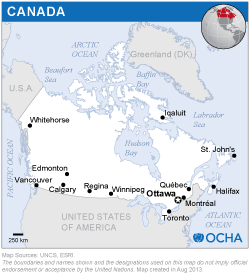The United Nations University Institute for Water, Environment and Health (UNU-INWEH) is one of 13 institutions comprising the United Nations University (UNU), the academic arm of the United Nations. UNU-INWEH operates globally to deliver research, policy engagement, and capacity development that advance sustainability, resilience, and human well-being. For nearly three decades, UNU-INWEH has been a global thought leader on water, health and environmental solutions, addressing critical global security and development challenges
As the newest Regional Support Office (RSO) in the UN-SPIDER network, UNU-INWEH brings its thematic and technical strengths to bolster Earth observation–based support for disaster risk reduction, emergency response, and recovery, especially in climate and water-related hazards and resource management.
UNU-INWEH supports capacity development through:
Regional and national training combining geospatial, climate, hydrological, and infrastructure analytics.
Toolkits and guidance that adapt global methods to local contexts, data, and institutional capacity.
Advisory missions and targeted analytical support for Member States seeking to integrate satellite data in disaster risk management.
Documentation and dissemination of best practices and case studies from the Global South, to promote learning and replication.
Through partnerships with national disaster management agencies, water or environment ministries, and academic institutions, UNU-INWEH aims to help countries internalize and sustain satellite-based methods over time.
UNU-INWEH organizes its work around five interconnected thematic areas that integrate science, policy, and capacity building:
1. Governance, Security and Justice — Enhancing water governance and strong institutions to address security and justice related issues at local, national and regional levels.
2. Water, Energy, and Critical Minerals — Improving water management and use across different sectors, ensuring that energy transitions are inclusive and sustainable, and promoting the responsible sourcing of critical minerals
3. Food, Land, and Biodiversity — Driving transformational change through the development and application of tools and multi-partner research on land and food systems, with the goal of protecting ecosystem services and enhancing human health and well-being.
4. WASH, Health, and Gender — Developing research-based solutions to improve WASH access, strengthen climate-resilient infrastructure, reduce health risk, and promote gender equality.
5. Geospatial, Climate and Infrastructure Analytics — Leveraging geospatial data, AI and advanced analytics to inform policymaking, advance climate action and empower communities to build resilient infrastructure and societies
These thematic areas intersect and reinforce each other, enabling UNU-INWEH to contribute to research, policy, and action that shape sustainable, resilient futures.
UNU-INWEH emphasizes the use of geospatial analysis, climate and infrastructure modeling, and analytics to inform policy and decision making.
Flood Inundation and Risk Mapping Tool (https://floodmapping.inweh.unu.edu/)
An online application that maps floodwater extents using optical and SAR remote sensing data within the Google Earth Engine platform. The tool enables historical flood inundation analysis, multivariate damage assessment, and identification of flood frequency and hotspot areas. It also features a flood risk mapping module for the Ganges-Brahmaputra-Meghna River Basin, integrating historical inundation records with socio-economic data.
SDG-6 Policy Support System (SDG-PSS): (https://sdgpss.net/en/)
The SDG-PSS enables water experts, researchers, and government actors to collaborate and produce national-level evidence on the enabling environment to achieve SDG 6.
Regulated Plants Database: (https://regulatedplants.unu.edu/)
An online database that provides comprehensive information about regulated plant species across different countries. It serves as a resource for researchers, agricultural professionals, and the public to understand the distribution and regulation status of various plant species that can be considered noxious.
UNU Sustainability Nexus AID (Analytics, Informatics and Data) Programme (https://www.sustainabilityaid.net/)
The Sustainability Nexus AID Programme is an initiative by UNU that aims at bridging this gap by identifying, developing, and promoting data, information, computational techniques, and analytical tools that facilitate addressing these challenges for the sustainable management of water, soil, waste, energy, and geo-resources based on nexus thinking
UNU-INWEH also has an online learning platform (UNU Online Learning Centre) that features self-paced learning courses related to its thematic areas. More info: https://lc.unu.edu/
In its role as an UN-SPIDER RSO, UNU-INWEH supports workflows combining Earth observation (satellite imagery, remote sensing) with climate, hydrological, and socio-economic data to deliver early warning, impact assessments, and recovery planning.
UNU-INWEH was established in 1996 through an agreement between the United Nations University and the Government of Canada. Headquartered in Richmond Hill, Ontario, the institute has been developing evidence-based solutions that advance human security, resilience and sustainability worldwide
More information can be found here: https://unu.edu/inweh

